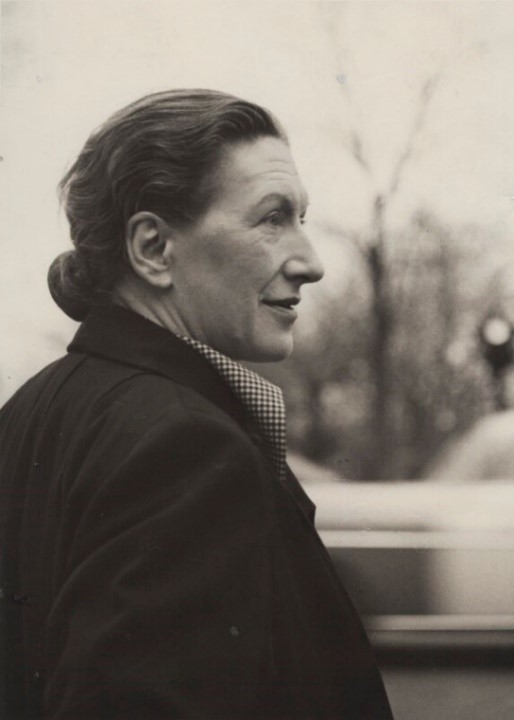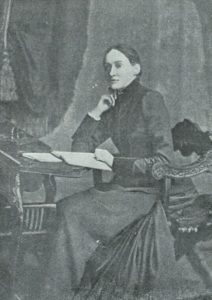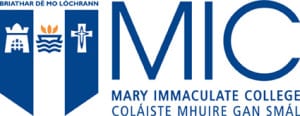‘THE EXTINGUISHED CASTLE’: ELIZABETH BOWEN’S HAUNTED HOUSE IN ‘HER TABLE SPREAD’
Dr Dawn Miranda Sherratt-Bado (Queen’s University Belfast)
Elizabeth Bowen (7 June 1899 – 22 February 1973)

Fig. 1 Elizabeth Bowen by Elliott Erwitt, 1950. National Portrait Gallery.
Elizabeth Bowen had a thing for haunted houses. They appear frequently in her oeuvre, and especially in her short stories. One such tale, the comically grotesque ‘Her Table Spread,’ from her fourth short story collection The Cat Jumps (1934), is set in a mysterious, unnamed ‘Castle,’ whose mistress hosts a dinner party which takes an extraordinarily strange turn.[i] Valeria Cuffe is an Anglo-Irish heiress in need of a husband and child to secure the future of her Castle and her line, and in this Gothic story Bowen explores the dark fantasy of Anglo-Irish ‘rule’. It is much-anthologised; for not only is it one of her best pieces of short fiction, it is also one of her handful of ‘Irish stories’. Of the eighty or so stories that Bowen published, less than a dozen are set in Ireland. Although the majority of critics have described ‘Her Table Spread’ as a haunted house tale, they have only discussed the spooky Castle in question as a generic symbol for the Anglo-Irish Big House. While the Castle does function on this level in the story, I would posit that its symbolism is far more layered and complex than critics have theorised previously.
Read MoreResearch Pioneers 12: Tina O’Toole
Tina O’Toole has been recognised as a leading scholar in Irish women’s studies since her first full-length published work, the Dictionary of Munster Women Writers, emerged in 2005 and added important names to the growing list of Irish women writers who had long been overlooked and/or understudied. O’Toole continued her excavation of under-represented Irish authors in her monograph The Irish New Woman (2013), and brought together a range of commentators on the confluence of women, writing and conflict in her co-edited volume Women Writing War: Ireland 1880-1922 (2016). Alongside a lengthy catalogue of her other published works, these texts combine to consistently question the masculine bias of Irish historiography in general and the Irish literary canon more specifically. Throughout her career, O’Toole has continued to make important feminist interventions in and correctives to the assumed landscape of Irish literature. In doing so, she has challenged perceived ideas about Irish gendered and sexual identities and has engaged in the process of introducing or reintroducing marginalised voices to national debates about these issues.
Read MoreResearch Pioneers 11: Julie Anne Stevens
Julie Anne Stevens is the leading expert in Irish literary studies on the works of the cousins Edith Somerville and Martin Ross. With two monographs on these collaborators – The Irish Scene in Somerville and Ross (2007) and Two Irish Girls in Bohemia: The Drawings and Writings of E.OE. Somerville and Martin Ross (2017), she has made an important contribution to the corpus of research on Irish women’s writing by showcasing the rich archival resources available in studying Irish women’s literary history in national and transnational contexts from the Land War to the Belle Époque. Throughout her career, Stevens has published on women writers, including Elizabeth Bowen, Mary Lavin, and Deirdre Madden. Her interests have always been on those writers who were either considered marginal or were believed to have written works in what were once deemed marginal genres, from children’s literature to ghost stories. Firmly grounded in an impressive array of archival material, her research weaves together literature and art, genre and readership.
Read MoreA Case for Editorial and Curatorial Interventions
Anna Pilz & Whitney Standlee, Network Team
In the papers of Katharine Tynan Hinkson held at the John Rylands Library in Manchester is a strongly worded letter from 1902 that attests to the difficulties that tend to assail the editors of volumes of literature. The letter in question is from Tynan’s fellow Irish writer George Egerton (Mary Chavelita Dunne), and was written to raise objections to the selection of Egerton’s works that Tynan was seeking permission to include in The Cabinet of Irish Literature, a four-volume anthology of Irish writing she was re-editing and expanding at that time. ‘I do not think it would be fair to me to merely give an extract from my first book “Keynotes,”’ Egerton wrote, ‘as that conveys the impression, in a measure, that I have not done any work equal to it […] I am willing to be represented by an extract from Keynotes and one from Rosa Amorosa.’[1] The volumes that Tynan eventually produced are remarkably varied and inclusive, and perhaps most noteworthy for the fact that they (as is noted on the title page) were ‘greatly extended by Katharine Tynan Hinkson’. Those extensions primarily consisted of introducing additional and more diverse women’s writing into the mix, but also clearly involved a measure of compromise: it is indeed one selection from Egerton’s Keynotes and another from Rosa Amorosa that appear in the final compilation.
Read MoreResearch Pioneers 10: Mary S. Pierse
Research Pioneers 10 – Mary S Pierse
Tweet
Mary S. Pierse edited, in 2010, the pioneering Irish Feminisms, 1810-1930 (Routledge). In these five volumes, she brought together 180 documents from a variety of genres that invite enticing and creative connections between historical documents, periodical press contributions, and literary texts. ‘The scale of editorial endeavour here’, Margaret Kelleher’s review of the collection notes, ‘was clearly immense and the achievement, including imaginative selections and meticulous textual detail, is warmly to be welcomed’ and goes on to refer to the timeliness of Pierse’s project: ‘Read in the context of our contemporary economic and social crises, the relevance of many of the writings collected by Pierse (including political manifestoes, crusading journalism, new educational agendas, as well as poetic and fictional reimaginings of personal and social responsibility) appears even more compelling.’ Among those many Irish women writers whose works Pierse’s retrieval efforts draws renewed attention to are M. E. Francis, Rosamund Jacob, Katherine Cecil Thurston, Rosa Mulholland and Nora Hopper.
Read MoreFrom the archives: Annie M.P. Smithson Correspondence with Edmund Downey
Kathleen Williams, Network Team
In 2016 staff at the John J. Burns Library at Boston College had opportunity to review a large collection of materials related to Irish women during the revolutionary period in Ireland that had been assembled by collector Loretta Clarke Murray. These materials in many cases spanned the time frame that included the pre-1916 Rising period through the Civil War, and for papers of some figures such as Kathleen Clarke, up to the mid-20th century.
Read MoreNetwork Publication: Irish Women Writers at the Turn of the Twentieth Century: Alternative Histories, New Narratives
Edited by Kathryn Laing and Sinéad Mooney
Introduction: “A Palpable Energy”
Kathryn Laing and Sinéad Mooney
Silenced female voices, the gendered gaps and absences in archives and literary histories, and silence as theme and technique, all feature in many of the essays included in this collection. Addressing these occlusions and retrieving these voices is the chief thread that connects this project to numerous predecessors, not least the groundbreaking publication in 2002 of volumes IV and V of the Field Day Anthology of Irish Writing, dedicated to women’s writing and traditions in response to their underrepresentation in the original three volumes. However, Irish Women Writers at the Turn of the Twentieth Century: Alternative Histories, New Narratives, while still addressing itself to issues of representation, retrieval and reconsideration of the silenced, ironically finds itself participating in a rich and multi-voiced critical conversation.
Read MoreRecovering Irish Women Writers: Lady Virginia Sandars, a Contemporary of Wilde, Hardy and Kipling
Dr Paul O’Brien (MIC, Limerick)
Lady Virginia Sandars (17 March 1828 – 26 January 1922)
Lady Virginia Frances Zerlina Taylour was the youngest daughter of Thomas Taylour, the 2nd Marquess of Headfort and Olivia Stevenson. A member of the Anglo-Irish ascendancy, Virginia lived in the large, eleven-bay Robert Adam designed, Headfort House in County Meath. Her father, Thomas Taylour, 2nd Marquess of Headfort, was connected through marriage to the Earl of Dunraven and the Earl of Spencer. The vast Taylour estate amounted to 20,000 acres in Cavan and Meath. Taylour represented Kells in the Irish parliament from 1776 to 1790, subsequently sitting as MP for Longford until 1794 and Meath until 1795.
Read MoreResearch Pioneers 8: David Clare, Fiona McDonagh and Justine Nakase
David Clare, Fiona McDonagh and Justine Nakase are in the final stages of a project that promises to be a milestone in scholarship on women’s contribution to Irish theatre. They are co-editing the weighty two-volume collection The Golden Thread: Irish Women Playwrights (1716-2016), forthcoming with Liverpool University Press. This project evolved from their ‘Irish Women Playwrights and Theatremakers Conference’ at Mary Immaculate College, University of Limerick, in June 2017. Together the editors combine expertise in Irish drama and theatre from the eighteenth century to the present.
Read More



